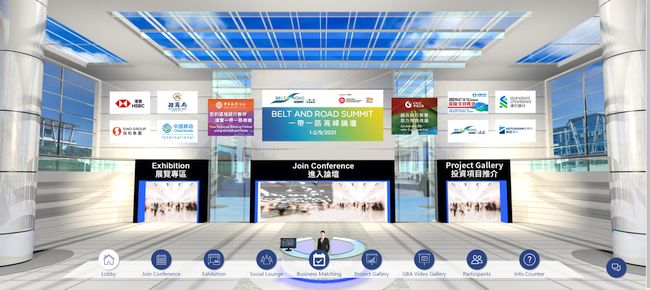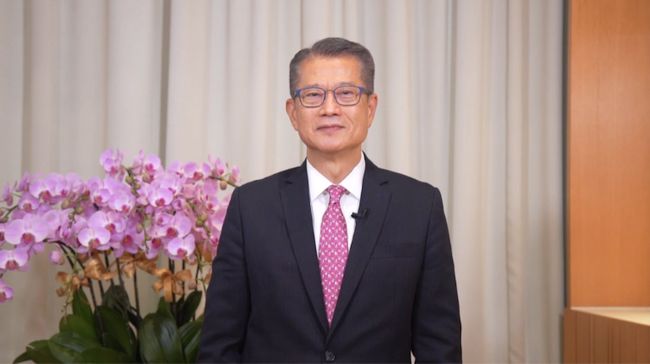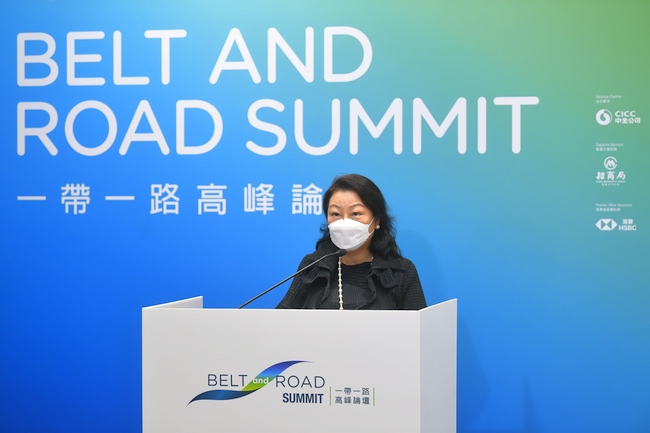Government and business leaders foster trade and investment
The sixth Belt and Road Summit, jointly organised by the Government of the Hong Kong Special Administrative Region (HKSAR) and the Hong Kong Trade Development Council (HKTDC), drew to a successful close yesterday (2 September). In response to the COVID-19 pandemic, this year’s summit was changed to an online event. The virtual platform helped to overcome geographical boundaries, with more than 17,000 viewers from about 80 countries and regions attending the summit.



Under the theme “Driving Growth through Fostering Regional and International Trade”, the two-day summit featured more than 80 government and business leaders from countries and regions along the Belt and Road, along with investors from Mainland China, the Asia-Pacific region, Europe, the Middle East and Africa as well as project owners and professional investment advisers. They all came together to discuss the latest developments driven by the Belt and Road Initiative.
Investment projects drive geographical connections
Holding the conference virtually presented no barrier to meaningful exchanges among participants. In addition to various breakout discussion sessions, the 2021 summit featured one-to-one business matching meetings and project pitching sessions that proved popular among both project owners and participants. The summit received over 260 investment projects from 42 countries and regions along the Belt and Road and beyond, including the Greater Bay Area, Indonesia, Thailand, Philippines, Sri Lanka, Italy, Egypt, UAE, Djibouti and others, focusing on four major areas – (1) energy, natural resources and public utilities; (2) innovation and technology; (3) urban development; and (4) transport and logistics infrastructure.
Belt and Road and RCEP foster global growth
The Regional Comprehensive Economic Partnership (RCEP) has become a key milestone in regional cooperation, developing significant synergies with the Belt and Road Initiative. In a plenary session titled “Belt and Road and RCEP: Enhancing Regional Business Connectivity”, Paul Chan, Financial Secretary of the HKSAR, remarked that Hong Kong’s strategic location makes the city a gateway for trade, investment and business between Mainland China and other RCEP economies, particularly countries in the Association of Southeast Asian Nations (ASEAN). “Hong Kong’s trade in goods with the 15 RCEP economies last year totalled US$772 billion, accounting for about 73% of our total merchandise trade. In 2019, our trade in services with the RCEP was worth US$103 billion, accounting for nearly 60% of our services trade. China’s 14th Five-Year plan supports Hong Kong’s status as an international financial, transport and trade centre, and it encourages our continuing cooperation and exchanges with countries and regions around the world,” Mr Chan said.
Huang Zhaohui, CEO and Chairman of the Management Committee, China International Capital Corporation (CICC), stated that the RCEP covered about one-third of the world’s total population and accounted for one-third of global GDP, making it the world’s largest free trade agreement. He believes the RCEP will bring great benefits to regional trade and investment. “The RCEP will deepen trade and economic connections between leading countries in the region through tariff reductions. We expect that China-Japan trade tariffs will be significantly reduced while China and Korea will further promote trade facilitation in key areas. This in turn will effectively increase the volume of trade between member countries and enhance regional economic vitality and competitiveness. At CICC we have decided to increase our overseas deployment, especially in Belt and Road countries. We are looking forward to long-term investment, leveraging our financial capabilities to assist the economic and capital market development of these countries.”
Edward Yau, Secretary for Commerce and Economic Development of the HKSAR, added that Hong Kong has been striving to expand its economic and trade network worldwide through regional cooperation. “While we are seeing some backpedalling in certain areas of the global economy, there are sufficient incentives and also momentum to move towards to more regional cooperation. Hong Kong stands ready, as always, to be the platform and also the conduit for freer trade, not just in our part of the region, but also in the wider sense of the global economy.”
Opportunities abound in Greater Bay Area
The 14th Five-Year Plan highlighted how the development of the Greater Bay Area will lead to boundless opportunities. This year’s summit included the new GBA Track thematic series that featured plenary and panel discussion sessions, thematic breakout sessions and a virtual exhibition, covering a wide range of topics, including capital raising, green finance, digital technology applications and start-ups. Sun Yu, Vice Chairman and Chief Executive, Bank of China (Hong Kong) noted, “Infrastructure construction is the key to success of the Belt and Road Initiative, as infrastructure construction has a strong correlation with GDP growth. The tremendous demand for infrastructure investments along the Belt and Road has presented new business opportunities for commercial banks. Hong Kong commercial banks can take up the role as the project financing advisor and solutions provider. Through collaboration with policy banks, insurance companies, law firms and business consultants, they can build a financial services ecosystem, and make good use of market-oriented mechanism to provide systematic, diversified and innovative solutions, as well as financing support for suitable infrastructure projects.”
Teresa Cheng, Secretary for Justice of the HKSAR, delivered a welcome speech in a session titled “Fostering Trade and Resolving Disputes in the Post-COVID Era – Hong Kong’s Legal and Dispute Resolution Services”. She mentioned the business opportunities and unique advantages of Hong Kong under “one country, two systems”, explaining that the 14th Five-Year Plan and Greater Bay Area Outline Development Plan explicitly support Hong Kong as the centre for international legal and dispute resolution services in the Asia-Pacific region. “These two national policies have afforded incredible opportunities to the legal sector and therefore the businesses that utilise our legal and dispute resolution services,” she said.
China International Capital Corporation Ltd serves as the Strategic Partner of the sixth Belt and Road Summit; Bank of China (Hong Kong) Ltd as the Regional Banking Partner; China Merchants Group as the Sapphire Sponsor; China Taiping Insurance Group as the Affiliated Insurance Partner; and China Mobile International Limited as the Platinum Sponsor.
Websites
– Belt and Road Summit website: https://www.beltandroadsummit.hk/en
– HKTDC Belt and Road Portal: http://beltandroad.hktdc.com
– Photo download: https://bit.ly/3tgRVdG
About HKTDC
The Hong Kong Trade Development Council (HKTDC) is a statutory body established in 1966 to promote, assist and develop Hong Kong’s trade. With 50 offices globally, including 13 in Mainland China, the HKTDC promotes Hong Kong as a two-way global investment and business hub. The HKTDC organises international exhibitions, conferences and business missions to create business opportunities for companies, particularly small and medium-sized enterprises (SMEs), in the mainland and international markets. The HKTDC also provides up-to-date market insights and product information via research reports and digital news channels. For more information, please visit: www.hktdc.com/aboutus. Follow us on Twitter @hktdc and LinkedIn
Media enquiries:
HKTDC’s Communications & Public Affairs Department
Sunny Ng, Tel: +852 2584 4357, Email: sunny.sl.ng@hktdc.org
Clayton Lauw, Tel: +852 2584 4472, Email: clayton.y.lauw@hktdc.org
Christine Kam, Tel: +852 2584 4514, Email: christine.kam@hktdc.org













